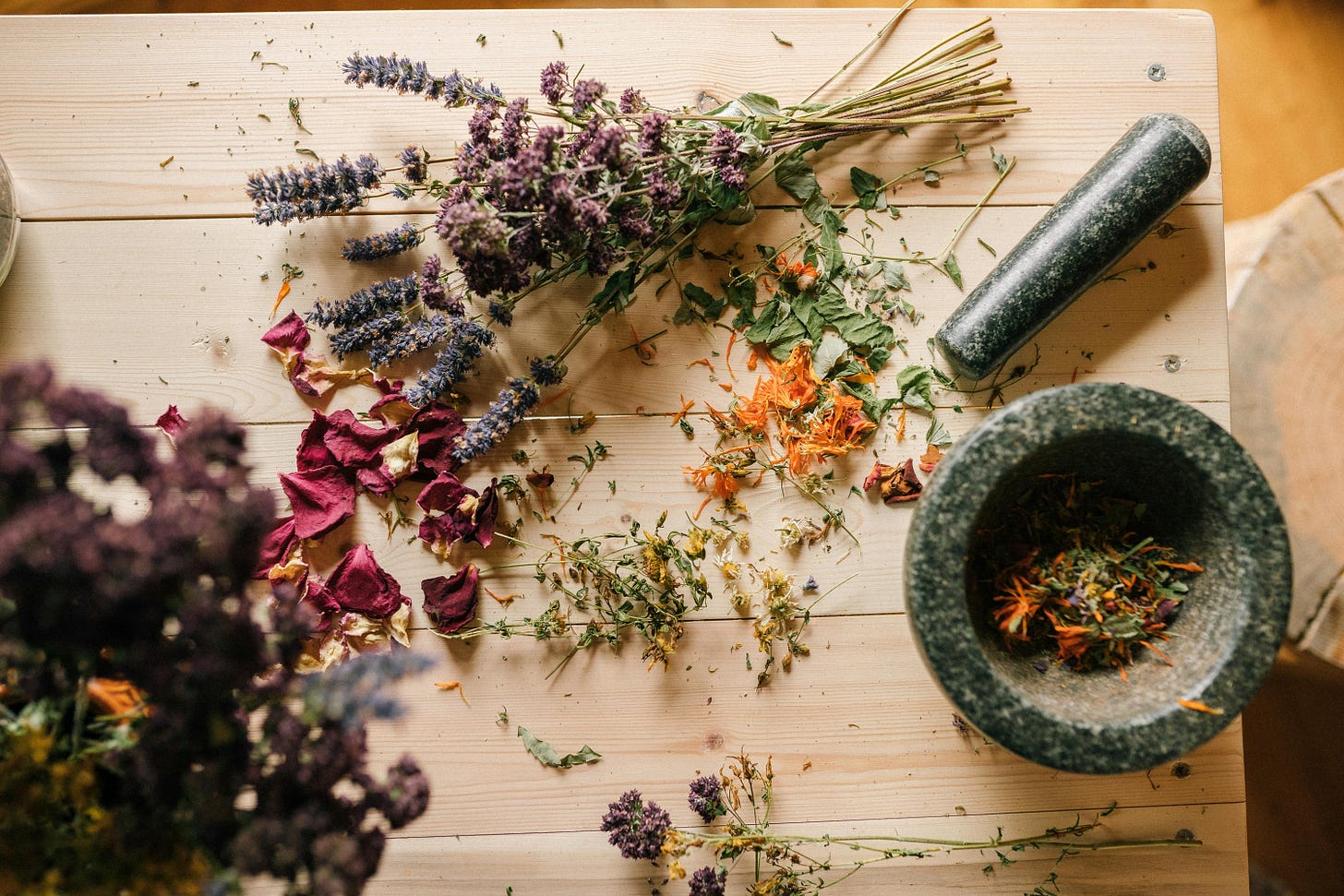My upbringing was shaped by generations of preachers, prayer warriors, and seekers. For as long as I can remember, that meant church every Sunday, and if I spent the night at a relative’s house, weeknights meant Bible study instead of my favorite sitcoms.
One of my clearest church memories is from when I was five. I’d sit quietly, watching the preacher in a white robe deliver the sermon while dabbing sweat from his brow. If it were my aunt preaching, she’d do it gracefully—wrapped in a white turban, blue contact lenses catching the light, beads of sweat shimmering on her foundation as she delivered the Word.
For as long as I can remember, I’ve watched people be blessed and anointed with holy oil. I used to think the oil came straight from heaven, something God poured into the bottle, until one day, I saw a bottle of Pompeian extra virgin olive oil on the altar.
Confused, I tugged at my grandmother’s arm and whispered, “Grandma? Is the preacher using that olive oil to pray for everybody?”
"Yes, honey,” she said.
"But… It’s just olive oil. Did God bless it Himself?”
"No, the pastor blessed it,” she replied, clapping to the choir’s harmony.
"Wait—does the pastor know God? Is the pastor God?”
She gave me that look, the one that said enough questions, and handed me my pink tambourine to keep me busy.
That was the first time I asked: What makes olive oil holy?
To this day, vials of blessed oil are passed around my family, used to anoint our bodies, doorways, and even car dashboards. I still have a bottle from my evangelist aunt, who transitioned in 2006. It’s over 20 years old and long gone rancid, but I keep it on my altar. It's a sacred piece of her.
Growing up, I wrestled with the idea that only pastors could bless oil; unless you were ordained, your prayers held less power. But I’ve understood I don’t need a pulpit to commune with the Divine. I am a child of God. I carry sacred authority.
I can infuse the olive or avocado oil in my kitchen with love, protection, and transformation. I don’t need to know the Bible from Genesis to Revelation to make something holy. Intention is enough. Spirit hears me.
A Brief History of Holy and Spiritual Oils Across Cultures
Sacred oils have been used for millennia across cultures as sanctification, healing, and spiritual connection tools. In the Hebrew Bible, holy anointing oil consecrated priests and kings, with a specific recipe in Exodus 30 blending myrrh, cinnamon, cassia, and olive oil, marking one as set apart for a divine purpose.
In Christianity, blessed oils like chrism are used in sacraments such as baptism and the anointing of the sick. Jesus, called the “Anointed One,” carries this legacy. In Islam, olive oil is honored in the Qur’an (Surah An-Nur 24:35) and praised by the Prophet Muhammad for its healing power.
Hindu rituals offer fragrant oils like sandalwood to deities, while African Traditional Religions use plant-based oils for protection, divination, and ancestral connection. In Buddhist traditions, oils are used in lamps or meditation to symbolize clarity and sacred presence. Ancient Egyptians anointed themselves with Seven Sacred Oils in temple and burial rites. At the same time, Indigenous American cultures use oils from cedar, sage, and sweetgrass to bless, cleanse, and commune with Spirit.
These ancient practices live on today through the use of essential oils used for intention-setting, energetic cleansing, and devotional rituals. Sacred oils remain timeless conduits between the physical and the divine.
Holy Oil vs. Spiritual Oil
Although I often use the terms interchangeably, I think it’s essential to name the subtle yet meaningful distinction between holy and spiritual oil.
Holy oil typically refers to oil consecrated within a religious or ceremonial context — often following a prescribed ritual, prayer, or invocation. It is usually prepared for sacred rites and sacraments, invoking divine authority or lineage.
Spiritual oil, on the other hand, may or may not be tied to institutional religion. It is crafted intentionally, often blending essential oils, herbs, and energetic practices like prayer, sound, or moon rituals. While it may serve similar purposes — protection, healing, clarity, or blessing — it is usually more fluid, personal, and rooted in intuitive or ancestral wisdom.
Changing My Relationship with Holy Oil
Creating oils and sacred blends has been part of my personal and spiritual practice for over a decade. I’ve often shared them with friends and family, who use them to anoint themselves and their homes or wear them as grounding perfume.
Over time, making spiritual oils has become a ritual of deep listening—each bottle a conversation between me, Spirit, and my ancestors. With every creation, I call in my ancestors and guides, infusing the oil with intention, sound, and healing. Whether it supports grief, deepens meditation, or offers a calming moment during a busy day, I hope these oils become companions for those on a spiritual path.
Sharing this medicine during my in-person sound bath meditation sessions has been a true gift. There's something deeply intimate and powerful about offering a part of my practice to others as they connect more fully with themselves. Spirit guided me to share my Wounded Healer Spiritual Oil with the world—an exclusive blend inspired by Chiron, the wounded healer archetype in Greek mythology. Infused with notes of sweet orange, lavender, and the flower essence of Star of Bethlehem to ease the energy of grief, this blend supports emotional healing and brings softness. It can be used in meditation, to anoint sacred items or spaces, or as a gentle fragrance on the body.
Shifting how I engage with holy and spiritual oils has deepened my connection to the Divine, transformed how I move through the world, and expanded how I hold space for others. This is more than oil; this is devotion, healing, and remembrance in a bottle.
To bring the Wounded Healer Spiritual Oil to your practice, visit www.thechironguide.com/store.








I love how you use the Star of Bethlehem flower essence in this spiritual oil. Just the significance of Star of Bethlehem alone, across religions is resonant to this topic. Thank you!
Thank you so much for sharing your oil preparation. It really gives me a better understanding of how and why to use sacred/holy oil. ♥️